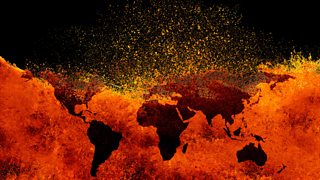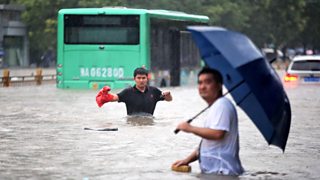What is the cost of climate reform?
What's happening to communities at risk of being left behind by a green transition?
It’s been a week of tough talk on climate action. President Biden set out US plans for fighting climate change and called on the industrialised world to join his efforts to dramatically slash carbon emissions this decade. The global shift towards a greener world is transforming the way we work and live, but for many the changes are coming at a steep cost. Fuel taxes have increased the cost of farming, the shutting down of carbon-intensive industries is disproportionately affecting those in low-paid jobs, and while many big businesses have the resources to go green, levies for failing to reduce carbon footprints are increasing costs for many small and medium-size businesses. So how can the burden of a green transition be shared more evenly? Is the world at risk of leaving marginalised communities behind, and - if so - what can be done to minimise any increase in inequality that results from attempts to battle climate change? Ritula Shah is joined by a panel of expert guests.
Last on
More episodes
Contributors
Nick Robins - Professor in Practice for Sustainable Finance at the Grantham Research Institute on Climate Change and the Environment, the London School of Economics
´¡²Ô²Ô±ð±ô²¹Ìý´¡²Ô²µ±ð°ù-°°ù²¹²¹±¹¾±Ìý- Leader of the Climate Change Policy Group at the Centre for Atmospheric Science, the University of CambridgeÂ
Heidi Binko - Co-Founder and Executive Director at the Just Transition Fund, a philanthropic initiative focused on the transition of coal communities in the United States
Picture
Broadcasts
- Fri 23 Apr 2021 09:06GMTÂ鶹ԼÅÄ World Service
- Fri 23 Apr 2021 23:06GMTÂ鶹ԼÅÄ World Service
- Sat 24 Apr 2021 03:06GMTÂ鶹ԼÅÄ World Service
Featured in...
![]()
Climate change: How it is affecting lives and the fight for change—Â鶹ԼÅÄ World Service special collections
The effects of climate change are destroying lives, environments and livelihoods
![]()
Extreme weather: A global record—Â鶹ԼÅÄ World Service special collections
Floods and wildfires are increasing in both frequency and intensity. What lies ahead?
The Real Story Podcast
Subscribe via your favourite podcast app...
Podcast
-
![]()
The Real Story
Global experts and decision makers discuss, debate and analyse a key news story.




